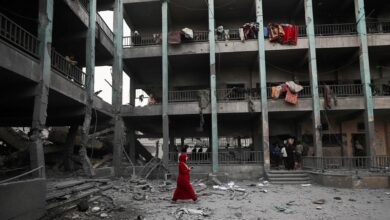How the Chief of Bangladesh Army Thwarted Yunus’ Intentions to Incite Conflicts with India
News Mania Desk / Piyal Chatterjee / 11th June 2025

Unus believed that instigating minor conflicts along the border with India would distract from the severely troubled internal issues and unite the public in his support. Confronted with increasing difficulties on various levels, the leader of Bangladesh’s interim government, Mohammad Yunus, devised a nefarious scheme early last month to shift focus from his numerous internal issues.
Yunus’ calculations suggest that a limited clash with India, restricted to the Indo-Bangladesh border, would eliminate all his issues and enable him to maintain his grip on power by dismissing demands for early elections.
He believed that all parties involved, including the general public, would set aside their disagreements in the name of nationalism and support him in the upcoming confrontation with India.
Per top sources within the Bangladesh Army and government, Yunus devised this strategy in collaboration with Jamaat-e-Islami Bangladesh and certain leaders of the newly established Jatiyo Nagorik Party (or National Citizens’ Party). The NCP, often referred to as the ‘king’s party’ in Bangladesh due to Yunus’ endorsement and robust backing, was created in February this year by leaders of the Anti-Discrimination Students’ Movement (ADSM), which led the revolt against Sheikh Hasina.
It is reported that Yunus conferred and refined the plan closely with National Security Advisor (NSA) Khalilur Rahman and the army’s Quarter-Master General (QMG), Lieutenant General Mohammad Faizur Rahman, around the period when India initiated ‘Operation Sindoor’ against Pakistan. The QMG is among the scarce individuals in the upper ranks of the army who is a firm Islamist and rivals the army chief.
Lt Gen Rahman, recognized for his proximity to Pakistan’s ISI, spearheaded an unsuccessful effort to depose the army chief in March of this year (refer to this). Since that time, he has been monitored closely and has almost no contact with the army chief. A Colonel-ranked officer affiliated with the 46th Independent Infantry Brigade, known as the ‘Dhaka Brigade’, situated within Dhaka Cantonment and directly commanded by Army headquarters, was assigned the responsibility of presenting the plan to the army chief.
This Colonel, believed to have connections with a few former ADSM leaders now in the interim government, maintains friendly relationships with high-ranking staff officers at army headquarters.
With India’s focus on Pakistan, Yunus and his associates believed that Pakistan would be less attentive to border provocations. They aimed to have the Border Guards Bangladesh (BGB) adopt an aggressive approach along the Indo-Bangladesh border, which would provoke skirmishes with India’s Border Security Force (BSF).
Following a governmental change in Dhaka in August, the BGB began a combative stance, disputing Indian constructions along the border and even attempting to halt a temple renovation in Assam in December. Reports indicated BGB’s involvement in protecting Bangladeshi criminals trying to breach the border before they eased this aggressive behavior in February on the directive of the Bangladesh army chief. The army chief reprimanded the BGB director general for fostering aggression, despite Yunus urging for increased provocation to incite nationalist sentiments among the Bangladeshi public. The underlying strategy relied on the army’s backing; in case of escalating violence, army troops could support the BGB, deterring the BSF. Discussions on the plan included consultations with senior officers and measures to secure army support via National Security Advisor Khalilur Rahman and Jamaat leaders. This strategy reached the army chief shortly after its inception, reflecting a coordinated effort between military and political entities.
General Waker-uz-Zaman held discussions with senior military officials, including Lt Gen Mizanur Rahman Shamim and service chiefs, who unanimously opposed Yunus’ border plan. The army chief informed both Yunus and the NSA that the proposal was reckless and warned against heightening tensions with India. He clearly stated the dangers of brinkmanship, asserting that the Bangladesh army lacked both the capacity and desire for conflict. He ordered no troop deployments along the border and instructed the BGB director general to refrain from receiving orders from outside the army’s chain of command.
The BNP, upon learning of Yunus’ intentions, voiced their strong opposition and advised him to focus on resolving domestic issues instead. A BNP committee member cautioned Yunus about the potential backlash of his plan. Faced with widespread opposition, including from the military, Yunus abandoned his scheme. However, some BNP leaders and retired military officials warned that if domestic challenges escalate for Yunus, he might resurrect the idea, potentially influenced by Pakistan’s ISI, which seeks to divert Indian resources to the eastern front amidst rising tensions. This strategy could alleviate pressure on Pakistan’s western front.
Since early this year, Yunus has faced mounting troubles at home, with growing political opposition as the BNP and other parties demand elections before year-end. While some Islamist groups support him and call for an extension of his rule, they lack significant public backing. Recent surveys indicate that the beleaguered Awami League still retains a loyal grassroots support of over 30%, despite many leaders being in exile or imprisoned. Increasing crime rates, including dacoities and assaults, especially in Dhaka, have further fueled public anger, compounded by high inflation of around 10%, causing essential prices to rise significantly.
The government’s inability to maintain law and order, alongside the incompetence of inexperienced advisors, has paralyzed administration. Development has stalled, corruption is rampant, and export earnings are declining, leading to widespread resentment. In light of these challenges, Yunus considered provoking small border skirmishes with India to distract from domestic issues and rally nationalistic sentiments. However, the army chief wisely rejected this misguided strategy, understanding the potential consequences of such a diversion, leaving Yunus in a precarious position amid rising discontent.






